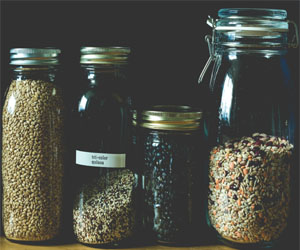


Nourishing Your Body And Mind

In today's fast-paced world, stress has become a common companion in many people's lives. From work pressures to personal responsibilities, stress can take a toll on our mental and physical well-being. While there's no magical cure for stress, the foods we eat can play a significant role in managing and reducing its impact. Superfoods, nutrient-rich foods packed with essential vitamins, minerals, and antioxidants, offer a delicious and effective way to combat stress and promote overall well-being.
Here's how superfoods can contribute to stress reduction:
Avocado: Creamy and rich in monounsaturated fats, avocados are not only a delightful addition to your meals but also an excellent source of stress-fighting nutrients. They contain B vitamins and potassium, which help lower blood pressure and reduce stress.
Berries: Blueberries, strawberries, and other berries are chock-full of antioxidants that combat oxidative stress. These antioxidants can help protect your body's cells from the damage caused by chronic stress.
Dark Chocolate: Dark chocolate in moderation can be a comforting treat and is known to trigger the release of endorphins, the body's natural stress relievers. It also contains flavonoids, which have been linked to lower stress levels.
Fatty Fish: Salmon, mackerel, and trout are high in omega-3 fatty acids, which have been shown to reduce stress and anxiety. These healthy fats are essential for brain health and mood regulation.
Leafy Greens: Greens like spinach and kale are rich in magnesium, a mineral that can help regulate cortisol, a hormone associated with stress. Consuming more magnesium can have a calming effect on the body.
Nuts: Almonds, walnuts, and pistachios are packed with nutrients, including B vitamins and healthy fats, which are known to reduce stress and support overall mental well-being.
Turmeric: The active compound in turmeric, curcumin, has anti-inflammatory and antioxidant properties. These qualities can help combat stress and reduce the risk of depression.
Oats: Oats are a complex carbohydrate that can boost serotonin production in the brain. Serotonin is a neurotransmitter that plays a key role in mood regulation and can help reduce stress.
Green Tea: Green tea is a source of L-theanine, an amino acid that can have a calming effect on the mind. It can help reduce stress and improve mental clarity.
Greek Yogurt: Probiotic-rich foods like Greek yogurt support the gut-brain connection. A healthy gut is essential for emotional well-being, as it produces neurotransmitters like serotonin.
It's important to remember that while incorporating these superfoods into your diet can help manage stress, they are most effective as part of a balanced and healthy eating plan. Reducing the intake of highly processed and sugary foods can also contribute to stress reduction.
Furthermore, stress management techniques such as regular exercise, mindfulness, and adequate sleep should be part of a holistic approach to stress reduction. The combination of a balanced diet and lifestyle choices can go a long way in promoting mental and physical well-being.
Superfoods are a valuable ally in the battle against stress. Their nutrient-rich profiles can nourish both your body and mind, helping you better manage and reduce the effects of stress. By making mindful food choices and embracing a holistic approach to well-being, you can enhance your resilience and overall quality of life.
 Mindfulness Meditation: Mindfulness meditation is a powerful relaxation technique that doesn't require an extensive time commitment. Just a few minutes each day can make a significant difference. By focusing on the present moment and being fully aware of your thoughts and feelings without judgment, you can reduce stress and enhance relaxation.
Mindfulness Meditation: Mindfulness meditation is a powerful relaxation technique that doesn't require an extensive time commitment. Just a few minutes each day can make a significant difference. By focusing on the present moment and being fully aware of your thoughts and feelings without judgment, you can reduce stress and enhance relaxation.
Deep Breathing Exercises: Deep breathing is a simple and quick relaxation method that can be practiced anywhere. Taking slow, deep breaths calms the nervous system, reduces stress, and promotes a sense of calm. Try inhaling deeply through your nose for a count of four, holding for four, and then exhaling for a count of four.
Progressive Muscle Relaxation: This method involves systematically tensing and then relaxing different muscle groups in your body. It helps release physical tension and promote relaxation. It can be done in a short amount of time and is particularly effective for those with a hectic schedule.
Visualization: Visualization involves mentally immersing yourself in a peaceful, calming place or situation. Close your eyes, and imagine a serene beach, a forest, or any location that makes you feel relaxed. Visualization can transport you to a tranquil mental space even during a busy day.


A Recipe For Success
 2. Create A Balanced Plate: When planning gluten-free meals, aim to create a balanced plate that includes protein, vegetables, and gluten-free grains. This combination ensures you get a variety of nutrients and keeps your meals satisfying and filling.
2. Create A Balanced Plate: When planning gluten-free meals, aim to create a balanced plate that includes protein, vegetables, and gluten-free grains. This combination ensures you get a variety of nutrients and keeps your meals satisfying and filling.
3. Stock Your Kitchen: Ensure your kitchen is well-stocked with gluten-free essentials. This includes gluten-free grains like rice, quinoa, and gluten-free pasta, as well as a variety of proteins, fresh fruits, vegetables, and gluten-free cooking staples like gluten-free flours.
4. Explore Gluten-Free Recipes: There is a plethora of gluten-free recipes available online and in cookbooks. These resources can provide inspiration and guidance for creating delicious gluten-free meals. Experiment with new recipes to keep your meals interesting and flavorful.
5. Plan Ahead: Effective meal planning involves thinking ahead. Set aside time each week to plan your meals, create a shopping list, and prepare some elements in advance, such as washing and chopping vegetables. This will make meal preparation more efficient during the week.
6. Read Labels Carefully: When purchasing packaged foods, always read labels diligently. Look for the "gluten-free" label or certifications to ensure the product is safe. Also, be aware of potential hidden sources of gluten in ingredient lists.
7. Be Mindful When Dining Out: Eating out can be a bit more challenging, but it's manageable with some careful planning. Research gluten-free-friendly restaurants in your area, and when dining out, communicate your dietary needs to the server.
A Journey To Inner Strength
 Emotional Regulation: Self-reflection allows individuals to recognize their emotional responses to challenging situations. This awareness is the first step in regulating and managing those emotions effectively.
Emotional Regulation: Self-reflection allows individuals to recognize their emotional responses to challenging situations. This awareness is the first step in regulating and managing those emotions effectively.
Self-Awareness: Self-reflection helps individuals gain a deeper understanding of their strengths, weaknesses, and triggers. This self-awareness can be pivotal in developing a resilient mindset.
Learning From Experiences: Reflecting on past experiences, especially adversity, provides an opportunity for growth and learning. It allows individuals to extract valuable lessons from setbacks and difficulties.
Improved Problem-Solving: Through self-reflection, individuals can evaluate their problem-solving approaches and adapt them to better tackle future challenges.
Practical Steps For Building Resilience Through Self-Reflection
Journaling: Maintain a journal to record your thoughts, emotions, and experiences. Regularly writing down your reflections on daily events can help you identify patterns in your behavior and thought processes.
Mindfulness Meditation: Engage in mindfulness meditation practices to cultivate awareness of the present moment. This can help you develop a deep understanding of your thoughts and emotions and promote emotional regulation.
Regular Self-Check-Ins: Dedicate time for self-check-ins throughout the day. Pause to ask yourself how you're feeling, what's on your mind, and how you're reacting to various situations.






Nourishing Your Way To Optimal Well-Being
 2. Antioxidant Power: Antioxidants, which are abundantly present in many superfoods, combat oxidative stress and protect the body from free radicals. This protection can lead to enhanced vitality and longevity by reducing the risk of chronic diseases and aging-related damage.
2. Antioxidant Power: Antioxidants, which are abundantly present in many superfoods, combat oxidative stress and protect the body from free radicals. This protection can lead to enhanced vitality and longevity by reducing the risk of chronic diseases and aging-related damage.
3. Energy Boost: Superfoods are packed with macronutrients that provide sustainable energy. Complex carbohydrates in foods like quinoa, healthy fats in avocados, and plant-based proteins in chia seeds can keep you energized throughout the day, allowing you to seize life's opportunities with vigor.
4. Immune Support: Many superfoods, such as citrus fruits, garlic, and ginger, offer essential nutrients and compounds that strengthen the immune system. A robust immune system is key to warding off illness and maintaining vitality.
5. Inflammation Control: Chronic inflammation is a root cause of numerous health problems, from heart disease to joint pain. Superfoods like berries, turmeric, and leafy greens have anti-inflammatory properties that help combat inflammation and promote overall well-being.
6. Skin Radiance: The appearance of your skin is often a reflection of your overall health. Superfoods like sweet potatoes, which are rich in beta-carotene, and nuts, which provide healthy fats, can contribute to a vibrant complexion and skin health.
7. Cognitive Clarity: Superfoods that are high in omega-3 fatty acids, like fatty fish and walnuts, support brain health and cognitive function. A sharp mind and mental clarity are essential for vitality and quality of life.
8. Digestive Health: A well-functioning digestive system is vital for nutrient absorption and overall vitality. Superfoods like yogurt with probiotics, fiber-rich legumes, and fermented foods promote gut health, reducing the risk of digestive issues and enhancing nutrient uptake.
9. Cellular Rejuvenation: Superfoods often contain compounds that support cellular repair and regeneration. This can lead to improved vitality by promoting overall cell health and longevity.
A Path To Inner Peace And Balance
 The Power Of Presence
The Power Of Presence
One of the primary benefits of mindful living is the ability to be fully present in all aspects of life. When you're mindful, you're not dwelling on the past or worrying about the future; you're right here, right now. This kind of presence allows you to appreciate the beauty of everyday moments, whether it's the taste of your morning coffee, the warmth of a hug, or the sound of birds singing.
Reducing Stress And Anxiety
Stress and anxiety are common companions in today's world. Mindful living offers a way to manage and even alleviate these burdens. By focusing on the present moment and approaching life's challenges with an open and nonjudgmental attitude, you can reduce the mental clutter that often contributes to stress and anxiety. This practice allows you to respond to life's difficulties with greater resilience and composure.
Enhancing Emotional Well-Being
Mindful living also has a profound impact on emotional well-being. It encourages self-awareness and self-compassion, helping you understand your feelings and react to them with kindness rather than judgment. This emotional intelligence can improve relationships with yourself and others, as well as boost overall contentment.
Mindful Practices For Everyday Life
Incorporating mindfulness into your daily routine doesn't require elaborate rituals. Simple practices can make a big difference:
Meditation: A few minutes of meditation each day can help you establish a daily mindfulness habit.
Deep Breathing: Taking a moment to focus on your breath, inhaling and exhaling deeply, can center you in the present moment.